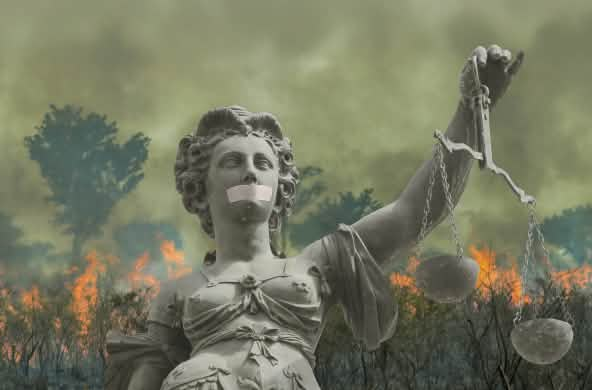
Completed campaign
Brazil: President Lula, use your veto – stop the “devastation bill”!
With Bill PL 2.159/2021, the Brazilian parliament aims to drastically weaken environmental and rainforest protections. In the future, corporations would be able to issue their own environmental permits for projects. Urge President Lula to veto this harmful law!
To: the President of Brazil, Mr. President Luiz Inácio Lula da Silva
“Brazilian President Lula da Silva must veto the deforestation and environmental destruction law PL 2.159/2021 passed by parliament”In a dramatic late-night session, the Brazilian parliament passed Bill PL 2.159/2021 on July 17, 2025. This “devastation bill” represents a sweeping attack on the environment, the climate, and human rights.
In a joint letter, more than 350 organizations in Brazil expressed opposition to the law, stating that it “undermines the constitutional foundations of environmental policy and violates essential rights such as access to health and an ecologically balanced environment.”
If enacted, companies would effectively be able to issue their own environmental permits for projects – without independent review, environmental impact assessments, or the participation of affected communities.
This would allow companies to proceed with mining, industrial, infrastructure, and agricultural projects as they choose – even in sensitive ecosystems such as the Amazon rainforest.
Indigenous peoples and other traditional communities are being ignored, and authorities tasked with protecting nature and cultural heritage would lose their right to participate in decision-making.
The law grants unrestricted permission for further deforestation, violence, and climate-damaging emissions. It would be a disastrous setback for forest and climate protection – not only in Brazil, but globally.
The bill is now being sent to President Lula da Silva, who can either veto or approve it within 15 working days.
In November, the 2025 United Nations Climate Change Conference (COP 30) will take place in the Brazilian Amazon region, with President Lula da Silva acting as host.
For this reason, we urge President Lula da Silva to stop this law. Veto the “devastation bill,” PL 2.159/2021, completely and without compromise.
Start of petition: 18/07/2025
The Chamber of Deputies – the second chamber of the Brazilian Parliament – passed legislative package 2.159/2021 at 2:00 a.m. on July 17, 2025, with 267 votes in favor and 116 against. The bill is intended to relax environmental licensing regulations in Brazil.
The Senate had already approved the bill in May – after more than twenty years of dispute between the two chambers. Transparencia Internacional Brasil wrote that the law is “an open door for corruption.”
Now, Brazilian President Lula da Silva must exercise his right to veto the law – in whole or in part – within 15 working days. The Brazilian Parliament could override the presidential veto with an absolute majority of votes in both chambers (the Chamber of Deputies and the Senate). After that, the only remaining step would be for the law to proceed to the Supreme Court.
No to the “devastation bill”
More than 350 environmental organizations oppose the law, calling it the greatest setback for the environment since Brazil returned to democracy 40 years ago.
“We’re seeing the implosion of Brazil’s environmental licensing system, that is going to become full self-licensing, where a company just clicks a button and the permit gets printed,” Suely Araújo of the Climate Observatory told The Guardian. Araújo was president of the Brazilian environmental protection agency IBAMA from 2016 to 2018.
The Articulation of Indigenous Peoples of Brazil (APIB) writes that the law could undermine the rights of Indigenous peoples and also states that the only Indigenous member of Parliament present at the vote, Célia Xakriabá, was racially insulted.
According to the law, the authorities responsible for protecting the rights of Indigenous and Afro-Brazilian Quilombola communities should only have input in project approvals if their territories are already officially recognized.
However, this is still not the case for many ancestral territories of traditional communities, even though residents have been requesting recognition for many years. This would leave more than 30 percent of Indigenous territories and over 80 percent of Quilombola territories virtually unprotected.
“Many of these lands are already under dispute or being targeted by exploitative companies,” APIB Executive Coordinator Dinamam Tuxá told The Guardian. He therefore describes the adoption of the law as “the legalization of a process of extermination of Indigenous peoples.”
To: the President of Brazil, Mr. President Luiz Inácio Lula da Silva
Your Excellency, President Luiz Inácio Lula da Silva,
On July 17, the Brazilian public received with deep concern the news that the Chamber of Deputies had approved Bill 2,159/2021, known as the “devastation bill” because of its attempts to legalize violations against human rights and the environment.
As the leader of a nation with one of the world’s richest social and biological diversities, you are well aware of the consequences when environmental permitting is relaxed to favor large corporations, particularly in the agricultural, mining, and metalworking sectors.
Brazil and the international community remain deeply troubled by ongoing deforestation, arson, illegal logging, pollution resulting from mining waste and pesticides, as well as the extreme violence faced by Indigenous peoples, Afro-Brazilian Quilombolas, and traditional communities during the execution of major projects – even when such actions are in direct violation of existing laws.
In a nation without legal protections for the environment and human rights, as this bill would effectively allow, atrocities become inevitable.
Brazil stands at the forefront of the fight against climate change and is set to host the COP 30 climate conference in only four months.
Therefore, Mr. President, it is within your power to ensure that Brazil remains a leader in this effort, beginning at home by protecting our social and biological diversity through strict environmental permitting regulations.
We urge you to take a clear and resolute stance: Fully veto this bill.
Thank you.
Yours faithfully,
How the climate and rainforests are linked
Rainforests are complex ecosystems in which a vast number of animal, plant and fungi species are tightly interdependent. They play a major role in the local and global climate: In a process called photosynthesis, plants absorb the greenhouse gas carbon dioxide (CO2) from the air. With the help of water and sunlight, they form sugar and from it other plant building blocks. In doing so, plants sequester carbon in stems, leaves and roots while releasing oxygen into the atmosphere.
According to studies, rainforests sequester 250 billion tons of CO2, much of it in peat forests. Globally, this is equal to 90 times the man-made greenhouse gas emissions per year.
Rainforests themselves produce a large part of the high year-round rainfall they receive. Evapotranspiration, i.e. the moisture that the plants release through their leaves, is an important aspect here. The forests are hot and humid, but the clouds reflect much of the sunlight back into space – thus cooling the atmosphere. Without this effect, the areas would be even warmer.
As carbon sinks and rainmakers, intact forests play an important role in regulating the climate and are crucial to the fight against catastrophic climate change.
The problem: catastrophic climate change and forest destruction
Rainforests are increasingly unable to act as climate stabilizers: When they are destroyed for plantations, grazing area or mining projects, vast amounts of greenhouse gases are released. For example, forest fires in Indonesia accounted for one-third of total global emissions in 1997. The loss of peat forests is particularly devastating.
According to a study published by Nature, rainforests could tip from carbon sinks to carbon emitters solely due to changing climatic and growth conditions from 2035 onward – thus accelerating catastrophic climate change.
Because of the intricate interdependencies of the rainforest ecosystem, the entire web can suffer if it is damaged in one place. Take the water cycle, for example. If drier periods occur as a result of global climate change – and this is already being observed – the cycle may break down. This can lead to evergreen, lush rainforests becoming grasslands with far lower biodiversity. The local climate would become drier and hotter.
The 18 tipping points in the climate system are particularly ominous: If, for example, climate change in the Amazon region reaches a certain point, the process and the loss of the rainforest in its current form will become unstoppable.
One thing is clear: catastrophic climate change is man-made. 98 percent of the scientists who study climate issues agree. Because the climate is a highly complex system, researchers are constantly discovering new relationships, interpreting data in different ways and revising forecasts. This is completely normal in science. However, the findings of climatologists are becoming increasingly alarming.
The solution: rainforest protection is climate protection
Rainforests must be preserved because they are indispensable as carbon sinks and their further destruction would worsen the impact of catastrophic climate change. Climate protection is therefore rainforest protection and vice versa.
- We need to preserve forests and nature and heal damage. Forests are more than just carbon sinks – they are diverse ecosystems and home to millions of people.
- We need to protect the climate while preserving biodiversity. Catastrophic climate change and extinction are two existential crises that we must tackle together.
- We need to secure and strengthen the rights of indigenous peoples, who are often the forest's best stewards: We call it the rainforest – they call it home.
- We need to fundamentally change our way of life and how we do business: This will mean reducing our consumption of energy, food and raw materials instead of maintaining it by turning to “green products”. We must stop burning fossil fuels.
- We need to reform flawed climate policy: We must end the misguided use of biofuels, especially if they are based on palm oil, soy or sugar cane, and stop burning trees in power plants.
- We reject offset programs as a modern “indulgence trade” in which companies finance environmental protection measures in return for being allowed to pollute. We also reject supposedly more climate-friendly “bridge technologies” like replacing coal with natural gas.
- In the wake of the Covid pandemic, we need to rebuild the economy and society in an environmentally sound way. There must be no economic “stimulus programs” based on old formulas.
Tiago Rogero, The Guardian, 17/7/2025. Brazil passes ‘devastation bill’ that drastically weakens environmental law: https://www.theguardian.com/world/2025/jul/17/brazil-passes-devastation-bill-that-drastically-weakens-environmental-law
Observatôrio do Clima, 8 de julho de 2025. Não ao Projeto de Lei (PL) 2159/2021: https://www.oc.eco.br/wp-content/uploads/2025/07/ManifestocontraPL2159Assinado.pdf
Transparência Internacional Brasil, 21 de maio de 2025. PL 2159/2021: MAIOR RETROCESSO AMBIENTAL DOS ÚLTIMOS 40 ANOS E PORTA ABERTA PARA A CORRUPÇÃO:
Observatôrio do Clima, 8 de julho de 2025. Não ao Projeto de Lei (PL) 2159/2021:
https://www.oc.eco.br/wp-content/uploads/2025/07/ManifestocontraPL2159Assinado.pdf
Tiago Rogero, The Guardian, July 17, 2025. Brazil passes ‘devastation bill’ that drastically weakens environmental law:
APIB on Instagram, July 17, 2025. Repúdio: ABIB repudia atos de violência e racismo sofridos pela diputada federal Célia Xakriabá no Congresso Nacional:

